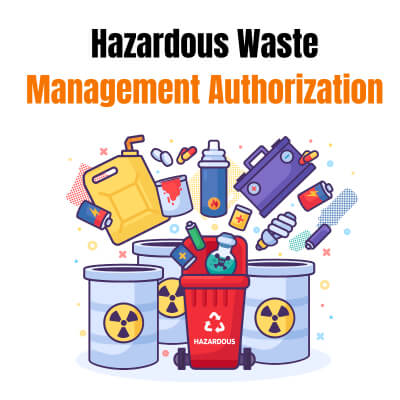
Hazardous waste management is essential to maintaining public health and safeguarding the environment. It is legally required to obtain the relevant authorization if your business handles hazardous waste. You can obtain hazardous waste management permission by following the easy steps in this tutorial.
Prior to beginning the authorization process, it's critical to comprehend the definition of hazardous waste. Materials that are reactive, combustible, toxic, or corrosive are classified as hazardous waste. Typical instances include insecticides, batteries, medical waste, and industrial chemicals. To protect people and the environment, these wastes must be managed properly.
Businesses that have been granted a license for hazardous waste management are guaranteed to handle, store, transport, and dispose of hazardous materials according to safe procedures. Businesses that operate without this permission risk legal repercussions, environmental damage, and public health hazards.
1. Identify Hazardous Waste
Finding out what kinds of hazardous waste your company produces is the first step. Compile a list of all the substances that are classified as dangerous. This will assist you in comprehending the particular rules and specifications that apply to your company.
2. Conduct a Waste Audit
Evaluating the amount and kind of hazardous waste your company produces is part of a waste audit. Understanding the amount of waste and the possible problems connected to it is made easier by this audit. For the application procedure to be completed, accurate audit data is necessary.
3. Understand Regulatory Requirements
There are distinct laws governing the handling of hazardous waste in various nations and areas. Examine the local ordinances and rules that are relevant to your company. Hazardous waste management is regulated by the Environmental Protection Agency (EPA) or a comparable agency in many nations.
4. Prepare a Waste Management Plan
A comprehensive waste management plan outlines how your business will handle hazardous waste from generation to disposal. This plan should include:
Your waste management plan should comply with local regulations and best practices.
5. Register with the Relevant Authority
After your waste management plan is complete, you must register your company with the appropriate government agency. Typically, this entails submitting an application and any necessary supporting materials, like the waste management strategy and audit findings. To prevent process delays, make sure the information you submit is correct and comprehensive.
6. Pay the Required Fees
Applications for hazardous waste management are often processed for a fee by regulatory organizations. The kind and volume of garbage your company produces determines the fee amount. To prevent any delays in the application process, make sure you pay the necessary payments as soon as possible.
7. Schedule an Inspection
The regulatory body may arrange for a facilities inspection once you submit your application. The inspection verifies that your company complies with all safety requirements and regulations related to the management of hazardous waste. Make sure all necessary paperwork and safety precautions are in place in order to be ready for the inspection.
8. Obtain Authorization
You will be granted authorization for the management of hazardous waste if your company passes the inspection. You can handle, store, transport, and dispose of hazardous material legally with this permit. A copy of the authorization should be kept at your facility, and all terms and restrictions should be adhered to.
Obtaining authorization is just the first step. Maintaining compliance with hazardous waste management regulations is an ongoing responsibility. Here are some tips to help you stay compliant:
1. Keep Records
Keep thorough records of every step involved in managing hazardous waste, including the creation, storage, transportation, and disposal of waste. These documents are necessary for regulatory audits and inspections.
2. Train Employees
Make certain that all workers who handle hazardous trash are properly trained in safe practices and emergency protocols. Having regular training sessions keeps everyone up-to-date on the most recent rules and safety procedures.
3. Monitor Waste Management Practices
Keep an eye on your waste management procedures to make sure you're following the rules. To find any areas that need improvement, conduct audits and inspections on a regular basis.
4. Update Waste Management Plan
To take into account any modifications to your company's operations or new regulations, review and update your waste management plan on a regular basis. Maintaining compliance and enhancing waste management procedures are made easier with an updated strategy.
5. Stay Informed
Make sure you are aware of any modifications to the laws governing the handling of hazardous waste. To be informed about the most recent changes, subscribe to updates from industry associations and regulatory bodies.
Proper hazardous waste management offers several benefits, including:
For more details, please visit Metacorp
For companies handling hazardous materials, obtaining a hazardous waste management authorization is an essential first step. You may make sure that your company complies with all laws and regulations and makes a positive = contribution to a safer environment by following the instructions provided in this guide. Recall that appropriate handling of hazardous waste is not only required by law but also a moral obligation to the environment and the community.





We are the pioneers in offering environmental consulting services to our patrons, giving us the first mover advantage & keeping us ahead of our competitors.
Very experienced in filing, monitoring & submission of CDSCO Compliances, Drugs Manufacturing & sale guidelines, Environmental Impact Assessment, AERB consulting services, Pollution Control Board CTE & CTO Advisory Services, Waste Management Authorization from State Pollution Control Boards, Fertilizers & Insecticides Manufacturing, Wholesale & Import Compliances
